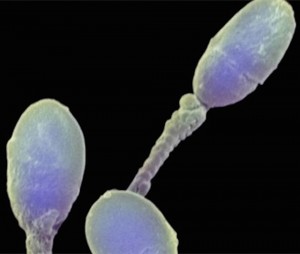What’s the most common definable cause of azoospermia among infertile men? Here’s a hint: it’s also pretty common in
general, occurring in 1/500 male births. Answer: Klinefelter syndrome. Men who have it possess an extra X chromosome in every cell in their bodies. It’s inherited, and about equally so from mothers and fathers.
The fact is that most men don’t know about it until they try to have kids, and can’t, because the ejaculate has no sperm in it. Others are diagnosed at puberty, when masculinization is delayed due to low testosterone levels. A small minority is diagnosed in
utero, during prenatal testing. In any case, Klinefelter men have relatively normal life spans and their most serious “illness” in life is often the infertility problem.

Fertility Factoids
Here is what we know about the fertility of Klinefelter patients:
- Despite having no sperm in the ejaculate, many (50-60%) men have testicular sperm that can be used to conceive biological children.
- Sperm production in the testicle tends to occur in “islands” or “pockets.”
- High technology pregnancies (IVF-ICSI) are necessary to have biological children.
- The vast majority of offspring of Klinefelter fathers do not have Klinefelter syndrome; instead they inherit normal chromosome numbers.
- It is thought that testicular sperm production decreases with time, in essence “petering out” as adult Klinefelter men age.
A Hot Tamale
I want to focus on the last point here, because it’s hot tamale among providers of infertility care. If most Klinefelter patients have testicular sperm, and sperm production declines with age, should we perform surgical sperm retrieval procedures in early adolescence rather than later in adulthood and freeze sperm to preserve future fertility? I will address this loaded question in my Round Table talk at the American Society of Reproductive Medicine meeting in Honolulu this week, smack-dab in the middle of tropical storm Ana. Here are the two sides of story:
Do It Now
Some say “get it while it’s hot” and go ahead and subject freshly minted adolescent boys to painful genital surgery with the hope of preserving their potential to become biological fathers several decades later.
Consider It Later
Others say, “let’s wait and see” and allow the kid to grow up like every other kid and decide for himself whether or not he wants to even have children, let alone go through major genital surgery.
The bottom line is that we simply don’t have enough clear evidence of if, when, how or why sperm production declines with age among Klinefelter men. And even if it does, maybe the biggest “hit” to sperm production occurs well before puberty, and by early adolescence, what’s done is done.
Although not currently a solvable problem, the good news is that it matters greatly to us as male fertility specialists. And because it matters, the research will continue, answers will be forthcoming and clinical care will improve. I will certainly continue to do my share to make sure this happens.
To read more from Dr. Turek’s blog go here
To read more about Men’s Health go here



